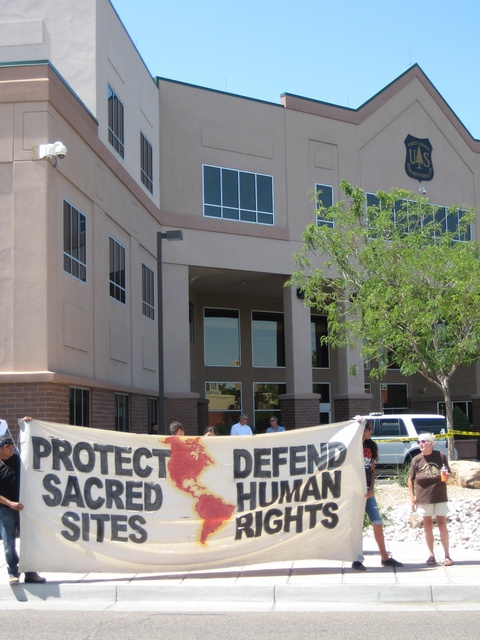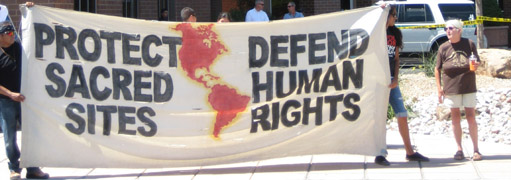Drummers provided a steady beat to the chorus of shouts and chants on Broadway. Passing cars honked their support, and elders spoke passionately about their culture and beliefs. The sun beat down on that hot, late-August afternoon, and the protesters were slick with sweat.The Arizona Snowbowl resort in Flagstaff began constructing a pipeline this summer to bring artificial snow to San Francisco Peak. The snow will be created from treated wastewater, and Native activists say it will desecrate land that 13 tribes hold sacred. Environmentalists worry about the destruction of the area’s ecology.Snowfall in the area is variable, and the pipe would provide a more consistent ski season, says Brady Smith, spokesperson for the Coconino National Forest. Arizona protesters traveled to Albuquerque where they were joined by local supporters outside the United States Forest Service’s regional headquarters. “Other than that it’s sacred to 13 indigenous nations, there are about 30 different plant species that only exist on that mountain. It’s sacred because it’s a special ecosystem,” says local Derek Bloom from the Black Mesa Indigenous Support collective. “We’re trying to spread the word that people care. It’s not just the Native folks in Flagstaff that are blocking streets.”The 777-acre ski resort in the Coconino National Forest operates under a special-use permit granted by the U.S. Forest Service. The federal agency responded to the demonstration by rolling out a yellow police tape to separate the protesters from the building. In February 2005, the Coconino National Forest Service released the final environmental impact statement detailing investigations into the environmental and cultural impact of the pipeline. The report states the Forest Service would work with the tribes to make sure they can still access plants needed for ceremonies and medicinal purposes.Coconino National Forest Supervisor Nora Rasure approved the pipeline construction. In her report she addresses fears of contaminating sacred ground: “Studies indicate the proposed use of reclaimed water for snowmaking represents a low risk of adverse environmental impact to plants, wildlife and humans.” Save the Peaks Coalition, an organization devoted to halting the construction, filed a lawsuit against the Forest Service in 2009. The group contends the federal agency did not sufficiently analyze the health risks associated with reclaimed wastewater. Coconino National Forest spokesperson Smith says the Forest Service considered all possible effects on the environment before approving the pipeline. “Wastewater is also used in playgrounds and golf courses,” he says. “The water has been used once and then allowed to trickle down through system. It’s not from sewage.” The water is classified as Class A or A-plus, meaning it’s fit for landscaping and snowmaking, Smith adds. Regardless of the classification of the reclaimed water, tribal leaders say spiritual as well as physical activities would be compromised. Louise Bernally, a Diné (Navajo) elder from Flagstaff says the reclaimed wastewater will desecrate the sacred nature of the land they use for gathering medicine and food for religious ceremonies. “It’s a church,” she adds.Smith says the Forest Service has done everything to include the tribes in the decision-making process, but he considers the affected land a small percentage of the mountains. “The area that a lot of people consider sacred up there covers 20,000 acres, and Snowbowl sits on 770 acres near that wilderness. The snowmaking would only be on 200 acres, which is 1 percent of that area,” he says.Though Save the Peaks Coalition took the matter to court, others pursue a more aggressive approach. Since pipeline construction began in mid-May, activists have taken direct action to deter its progress. Ned del Callejo, an activist from Flagstaff, says he was part of a blockade on Aug. 8 that prevented workers from getting to the pipeline. “That successfully stopped all construction for over seven hours,” says Ned del Callejo, an activist from Flagstaff. “So that’s one less day they’re desecrating the land.”They’re encouraged by the reception the movement has seen in Albuquerque, del Callejo says. “It’s actually really great to see folks being so receptive and a lot of the Native and non-Native community coming together. I see a lot of young folks and elders coming together to address these issues of ecocide and cultural genocide and spiritual genocide,” he says. “That’s crucial to the health and well-being not only of the movement but to the spirit of what we’re trying to demonstrate to them—that we’re resilient. We’re going to bounce back and stop them.”
To get involved in Black Mesa Indigenous Support contact Derek Bloom at (215) 820-3444 or Bobadochie@aol.com





